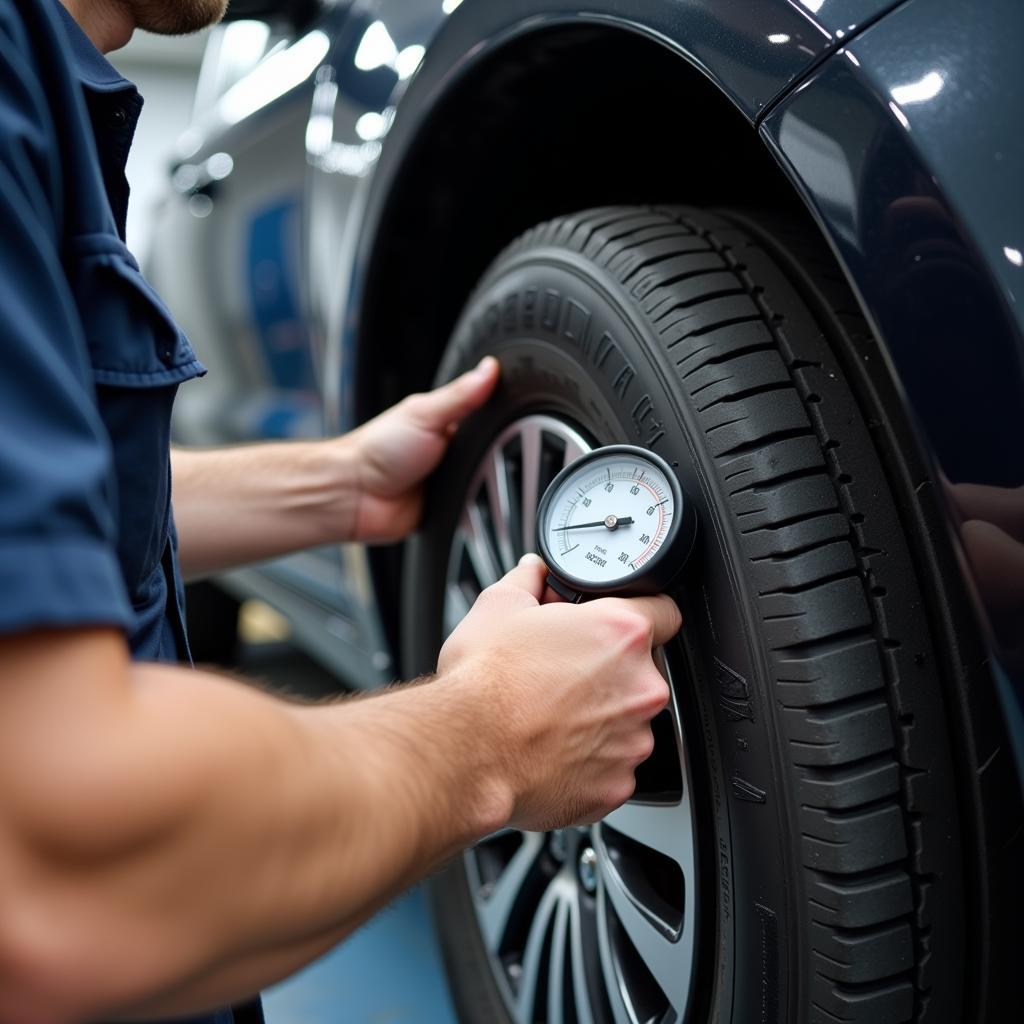What is Done in a Regular Car Service?
A regular car service is essential for maintaining your vehicle’s performance, safety, and longevity. Understanding what’s included in a typical service can help you make informed decisions about your car’s maintenance and keep it running smoothly. This article will delve into the specifics of a regular car service, outlining the key checks and procedures performed by qualified technicians.
What constitutes a “regular” car service can vary depending on the manufacturer’s recommendations, your car’s age and mileage, and your driving habits. Generally, services are categorized as interim or full services, with full services being more comprehensive and performed less frequently. Knowing the difference between these service levels is crucial for proper car maintenance. For more information on a full service, see our article on what is in a full service for a car.
What Checks are Performed During a Regular Car Service?
A standard car service includes a series of checks and replacements designed to address common wear and tear items and identify potential problems before they become major issues. These checks cover various aspects of your vehicle, from the engine and transmission to the brakes and tires.
- Oil and Filter Change: This is a fundamental part of any service. Old oil can lose its lubricating properties, leading to increased engine wear.
- Fluid Top-Ups: Essential fluids like coolant, brake fluid, power steering fluid, and windshield washer fluid are checked and topped up as needed.
- Brake Inspection: Brake pads, discs, and lines are inspected for wear and tear. Brake fluid levels are also checked.
- Tire Check: Tire pressure and tread depth are examined. Tires are also inspected for damage and uneven wear.
- Light Check: All exterior and interior lights are checked to ensure they are functioning correctly.
- Exhaust System Check: The exhaust system is inspected for leaks and damage.
- Steering and Suspension Check: The steering and suspension components are checked for wear and tear, ensuring proper handling and stability.
- Battery Check: The battery’s health and charge are assessed.
What is the Difference Between an Interim and Full Service?
While both interim and full services share some common checks, a full service is considerably more extensive. An interim service is generally recommended every 6 months or 6,000 miles, while a full service is typically performed every 12 months or 12,000 miles.
Interim Service: Focuses on essential checks and replacements.
- Basic checks listed above are usually included.
- Designed to keep the car running smoothly between full services.
Full Service: A comprehensive inspection and maintenance procedure.
- Includes all checks performed in an interim service.
- Covers more components and systems in detail.
- Often includes replacement of parts like air filters, spark plugs (petrol engines), and fuel filters (diesel engines).
- Provides a more thorough assessment of the vehicle’s condition.
Do you ever wonder why some car services seem less than satisfactory? Our article on why do car services suck explores this issue.
Why is Regular Car Servicing Important?
Regular servicing offers several significant benefits:
- Safety: Identifying and addressing potential safety issues, such as worn brakes or faulty lights, helps prevent accidents.
- Reliability: Regular maintenance keeps your car running smoothly and reduces the risk of breakdowns.
- Performance: Clean oil, fresh fluids, and properly functioning components contribute to optimal engine performance and fuel efficiency.
- Resale Value: A well-maintained car with a full service history commands a higher resale value.
“Regular servicing is an investment, not an expense,” says John Miller, a certified automotive technician with over 20 years of experience. “It’s far cheaper to address minor issues proactively than to deal with major repairs down the line.”
Accessing your car’s service history is essential for tracking maintenance and ensuring proper care. Check out our guides on how do i access my car service history and where to find detailed service history of a car for more information.
 Car Service Tire Check
Car Service Tire Check
Conclusion
Understanding What Is Done In A Regular Car Service is vital for every car owner. By adhering to the recommended service intervals and understanding the procedures involved, you can ensure your vehicle’s safety, reliability, and longevity. Regular maintenance is an investment that pays off in the long run, keeping your car on the road and minimizing unexpected repair costs.
FAQ
- How often should I service my car? Generally, every 6 months for an interim service and 12 months for a full service.
- What is included in a differential service on a car? For a deeper dive into differential service, read our article on what is differential service on a car.
- How much does a car service cost? The cost varies depending on the type of service and your car model.
- Can I service my car myself? While some basic checks can be done at home, it’s recommended to have a qualified technician perform a full service.
- Why is my car making a strange noise after a service? It’s advisable to contact your service provider immediately.
- What is the difference between a major and minor service? A major service is more comprehensive than a minor service and includes more checks and replacements.
- What should I look for in a good car service center? Look for certified technicians, positive reviews, and transparent pricing.
Need assistance with your car service? Contact us via WhatsApp: +1(641)206-8880, Email: [email protected] or visit our office at 456 Oak Avenue, Miami, FL 33101, USA. We offer 24/7 customer support.

